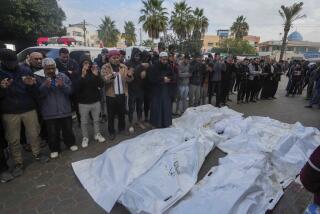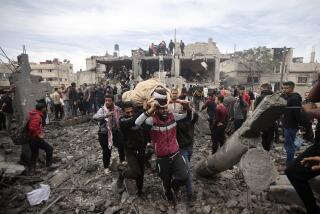Contras Reject Sandinista Offer on Delivery of U.S. Aid
MANAGUA, Nicaragua — The Contras on Friday turned down a Sandinista government offer to allow the International Red Cross to deliver non-lethal aid to their troops while peace talks continue.
“The Red Cross is identified with cases of tragedies, floods, earthquakes and refugees,” Pedro Joaquin Chamorro, a Contra leader, said. “To receive (aid) from the Red Cross would make our forces feel like refugees. The effect on their morale would be very damaging.”
Rebel negotiators had accused the government of trying to starve their troops into an agreement to disarm. Their quick dismissal of the offer appeared to undermine the argument that the U.S.-backed guerrillas are desperately short of food.
Second Rejection
It was the second proposal rejected by the rebels in as many days of talks here on how to carry out a preliminary peace accord. On Thursday, they refused to discuss a one-month extension of the truce, due to expire May 31.
As the talks foundered, Sandinista police broke up two anti-government demonstrations in Managua and made at least 60 arrests. Adolfo Calero, a rebel leader, expressed “grave concern” over the unrest, saying it is “not conducive to the process of reconciliation.”
Both Sandinista proposals were aimed at breaking a deadlock that has stalled four rounds of follow-up negotiations since the accord was signed March 23 at the Nicaraguan customs post of Sapoa.
The accord put the truce into effect. It also called for two subsequent agreements to end six years of war.
One agreement would separate the rival armies, permit the rebels to receive non-lethal aid, launch an exchange of prisoners and allow rebel leaders to bring their demands for sweeping political changes to a “national dialogue” between the leftist government and 14 opposition parties.
The other agreement would set a deadline for the rebels’ return to civilian life under an amnesty law.
A deadlock developed two weeks ago when the government insisted on negotiating both follow-up agreements at once, in a manner that would delay supplies for rebel troops and talks on political reform until Contra leaders agree to disarm their forces.
The rebels have rejected this formula and insist on using the “national dialogue” to extract pledges from the leftist Sandinistas to release their grip on the army and the state. They also propose linking disarmament to a “calendar” of Sandinista compliance.
The latest government offers, both presented Thursday, were aimed at allowing rebel forces to receive emergency food supplies as well as permitting an extra month for settling differences over how to reach an armistice.
The government would allow the Red Cross to deliver food, medicine, clothing and shelter to rebel forces until the end of May. It cited the Geneva-based organization’s neutrality, extensive experience in war situations and ability to start deliveries at once.
Victor Hugo Tinoco, Nicaragua’s deputy foreign minister, called the proposals “humanitarian in nature” and a test of the willingness of the rebel movement, which is apparently divided over the peace accord, to keep negotiating.
“We hope this is not a final rejection,” he said of the Contra reaction. “If so, this means one of two things: Either the Contra leaders in Miami do not care whether their troops are starving, or their troops are receiving aid illegally.”
The Reagan Administration resumed delivering non-lethal supplies to rebel base camps in neighboring Honduras last week. The Sandinistas say those deliveries violate the accord, but they have not reported any U.S. airdrops to rebels inside Nicaragua.
Rebel leaders gave conflicting accounts Friday of how their troops cut off from supply lines are faring. Calero asserted, “They are not hungry.” But Chamorro said, “They are barely subsisting.”
‘Give Aid to All the People’
Even so, Chamorro said, the Contras will insist that the Sandinistas agree to allow deliveries of non-lethal aid by a private airline. He said the airline would be named by the Reagan Administration and could be vetoed by the Sandinistas only with the support of an international commission that monitors the accord.
“If the Red Cross wants to help Nicaragua,” Chamorro said, “it can give aid to all the people, who are practically starving to death because of an economic crisis.”
As the talks recessed Friday, each side named a four-member commission to work into the night to try to resolve the deadlock. The current round of talks is due to end this evening.
On the table were two rival proposals: one by the Sandinistas that would set a deadline for disarming the rebels and one by the rebels calling only for a separation of forces.
More to Read
Sign up for Essential California
The most important California stories and recommendations in your inbox every morning.
You may occasionally receive promotional content from the Los Angeles Times.










